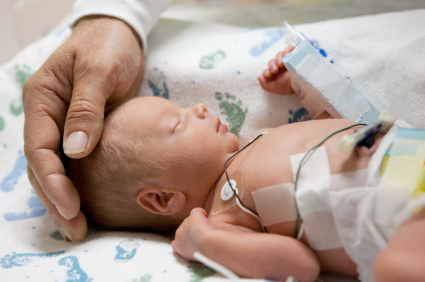No Relationship Between SSRIs in Pregnancy and Stillbirths or Neonatal Mortality
 Much has been written about the use of selective serotonin reuptake inhibitor (SSRI) antidepressants during pregnancy. In a review of 920,620 births in Denmark (1995 to 2008) that Jimenez-Solem published this year in the American Journal of Psychiatry, no link was found between any of the SSRIs used in any trimester and risk of stillbirth or neonatal mortality. The only exception was a possible association of three-trimester exposure to citalopram and neonatal mortality.
Much has been written about the use of selective serotonin reuptake inhibitor (SSRI) antidepressants during pregnancy. In a review of 920,620 births in Denmark (1995 to 2008) that Jimenez-Solem published this year in the American Journal of Psychiatry, no link was found between any of the SSRIs used in any trimester and risk of stillbirth or neonatal mortality. The only exception was a possible association of three-trimester exposure to citalopram and neonatal mortality.
Editor’s Note: These new data may be of importance to women considering antidepressant continuation during pregnancy when there is a high risk for a depressive relapse. A maternal depressive episode (like other stressors such as anxiety or experiencing an earthquake) during pregnancy does convey adverse effects to the child, so appropriate evaluation of the risk/benefit ratio or staying on an antidepressant through a pregnancy is important.
Folic Acid Supplementation Not Linked To Cancer
 Folic acid is often recommended for patients with difficult-to-treat depression and for pregnant women. A recent study suggested that when taken before and in the first weeks of pregnancy, the vitamin supplement can reduce the risk of autism in the child. However, some concern was raised after a 2007 study that suggested a possible link between folic acid and cancer risk. New research indicates that cancer is not a risk of folic acid supplementation.
Folic acid is often recommended for patients with difficult-to-treat depression and for pregnant women. A recent study suggested that when taken before and in the first weeks of pregnancy, the vitamin supplement can reduce the risk of autism in the child. However, some concern was raised after a 2007 study that suggested a possible link between folic acid and cancer risk. New research indicates that cancer is not a risk of folic acid supplementation.
In a meta-analysis that analyzed data from 13 different trials of folic acid that included a total of over 49,000 patients, no increased risk of cancer was found in patients taking folic acid. The meta-analysis was published this year in the Lancet.
Editor’s Note: In addition to folic acid’s beneficial effects during pregnancy, it can also enhance the effects of antidepressants and mood stabilizers. The dose typically recommended for depression is 1mg for women and 2mg for men.
Fifteen percent of the population has an inefficient form of the enzyme methylenetetrahydrofolate reductase (MTHFR), which converts folate to methylfolate. For treatment of depression in these individuals, l-methylfolate should be used instead of regular folic acid.
Reminder: Multiple Risks for Fetus in Mothers Treated with Valproate
In pregnant women, exposure of the fetus to the anticonvulsant valproate (VPA or Depakote) is associated with a variety of serious problems that include congenital malformations, developmental delay, and autism.
The major congenital malformations that can result from valproate exposure include spina bifida, which results in lifelong paralysis of the child’s lower limbs.
Developmental delay resulting from valproate exposure can cause an average loss of 9 IQ points compared to children exposed to other anticonvulsant drugs in utero. The effects appear to be in part dose-related and dependent on the intensity of combination treatment with other agents. These deficits were originally seen in children at 3 years of age and were shown to persist in six-year-olds according to an article by Meador et al. this year in Lancet Neurology.
Now in addition, fetal exposure to valproate has been liked to autism and related disorders in an 11-year longitudinal study published this year in the Journal of Neurology, Neurosurgery and Psychiatry. A diagnosis of a developmental disorder occurred in 17% of children whose mothers were on valproate as opposed to 2% whose mothers were on carbamazepine and 7% whose mothers were on lamotrigine.
Neurologists are increasingly recommending that all women of childbearing age who are on a treatment regimen including valproate be treated with folic acid and vitamins B6 and B12, in the hopes that these might mitigate valproate’s effects on the fetus in the case of an unplanned pregnancy. The effectiveness of these vitamins has not been directly demonstrated. However, the study by Meador et al. did show that children of mothers who took prenatal folic acid supplements had IQs on average 7 point higher than children whose mothers did not. The benefit was seen only when mothers were already taking folic acid when they became pregnant and was not observed in children of mothers who began taking it after the first trimester.
Women of childbearing age should avoid valproate and if this is not possible, they should carefully protect themselves against an unwanted pregnancy. Women with bipolar disorder are 3.9 times more likely to have unplanned pregnancies than women of similar age in the general population. These data suggest the importance of careful education about birth control in patients with bipolar illness so that pregnancies can be planned for periods of good health and so that appropriate pharmacological measures can be taken.
Preterm Birth Is a Risk Factor for Bipolar Disorder
A study published in the Archives of General Psychiatry in 2012 sampled over one million births in Sweden and suggested that preterm birth (from 32 to 36 weeks) doubled the risk that a child would develop bipolar disorder later in life. Those born even earlier had a sevenfold increased risk for bipolar disorder.
Editor’s Note: A robust research literature indicates that schizophrenia is related to obstetrical and other pre- and perinatal medical problems. Now it seems bipolar disorder may be as well, with some caveats. Low Apgar score (which indicates difficulties at birth) and delayed growth were not found to relate to bipolar risk. Thus something about the shortened preterm development seems to convey the risk. The authors suggest that there may be different types of factors that predispose a person to develop bipolar disorder, and that in some people the illness may have development origins.
These data also fit with observations that only about 50% of patients with bipolar disorder have a positive family history of the illness. Thus, while bipolar disorder does run in families and has a strong genetic basis in many instances, there are many people who develop the illness without having this genetic/familial risk. Very preterm birth appears to be one other contributing risk factor, presumably among many others. Understanding the neurobiological mechanisms occurring before birth that mediate this risk may lead to direct preventive measures to lessen the risk. In the meantime, traditional measures supporting good maternal and fetal health are a good place to start. These include regular prenatal checkups, good nutrition, and prenatal vitamins that include high doses of folic acid.
Folic Acid During Pregnancy May Lower Autism Risk
 A study of 85,000 children in Norway that was recently published in the Journal of the American Medical Association showed that women who took folic acid during pregnancy were 40% less likely to have a child who developed autism.
A study of 85,000 children in Norway that was recently published in the Journal of the American Medical Association showed that women who took folic acid during pregnancy were 40% less likely to have a child who developed autism.
A summary of the research by National Public Radio explained:
Folic acid is the synthetic version of a B vitamin called folate. It’s found naturally in foods such as spinach, black-eyed peas and rice. Public health officials recommend that women who may become pregnant take at least 400 micrograms of folic acid every day to reduce the chance of having a child with spina bifida.
The folic acid’s effect reduced the most severe cases of autism but did not seem to have an effect on the incidence of more mild forms, such as Asperger syndrome. The benefits were seen in those women who had been taking folic acid for 4 weeks before conception and continued to take the supplement during the first 8 weeks of pregnancy.
Prenatal BPA Exposure Might Lead to More Hyperactivity, Depression, and Anxiety in Young Children
An article published by Braun et al. in Pediatrics last year suggests that children who were exposed to higher levels of BPA while in the womb exhibited more anxious and depressed behaviors and poorer emotional control and inhibition at age 3. Braun described the implications of this finding to Medscape Medical News:
“At this point, we don’t know what these findings mean in terms of clinical disorders of behavior,” Joe M. Braun, MSPH, PhD, from the Department of Environmental Health, Harvard School of Public Health, Boston, Massachusetts, told Medscape Medical News. “Future studies will need to determine if BPA exposures are associated with clinical behavior disorders,” he said.
BPA is used in a variety of consumer products, including dental sealants, food/beverage containers and linings, medical equipment, and thermal receipts, such as those from ATM machines. Virtually all people in industrialized nations are exposed to the plasticizer.
“People who are concerned about BPA exposure could decrease or eliminate their consumption of canned or packaged foods; they could also avoid contact with thermal receipts,” Dr. Braun said.
Fish Oil May Help Prevent Post-Partum Depression
 An article in Time Healthland last year reported that preliminary research shows that women who took fish oil during pregnancy experienced fewer symptoms of post-partum depression than women who did not take fish oil supplements.
An article in Time Healthland last year reported that preliminary research shows that women who took fish oil during pregnancy experienced fewer symptoms of post-partum depression than women who did not take fish oil supplements.
This data has not yet been replicated, but since there are few side effects to taking fish oil supplements, which are high in omega-3 fatty acids, the risk-to-benefits ratio suggests that there is no reason pregnant women shouldn’t take fish oil supplements to decrease the likelihood of depression after delivery.
We have written before about the possible benefits of omega-3 fatty acids.
Maternal Smoking and Drinking Linked to ADHD in Kids with Bipolar Illness

At the 57th Annual Meeting of the American Academy of Child and Adolescent Psychiatry (AACAP) in New York in October 2010, Tim Wilens of Massachusetts General Hospital (MGH) presented data that maternal smoking and alcohol use during pregnancy both appeared to increase the risk of comorbid attention deficit hyperactivity disorder (ADHD) in children with bipolar disorder.
Maternal Depression May Affect Child’s Brain
At the 57th Annual Meeting of the American Academy of Child and Adolescent Psychiatry (AACAP) in October 2010, Dana Serino of Columbia University reported that mothers who experienced depression while pregnant had children with increased size in both their left and right medial temporal gyri, parts of the brain that may be responsible for judging distance, recognizing faces, and understanding word meaning.
Editor’s Note: These data extend preclinical studies that have shown that a variety of prenatal stressors are capable of exerting substantial effects on biology and behavior in children. In addition to affecting medial temporal gyrus volume, prenatal depression has also been shown to have effects on behavior of newborns, indicating that depression during pregnancy may have adverse effects on both the mother and the newborn.





